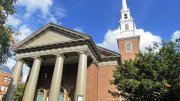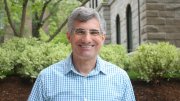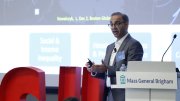Mixing joy at Harvard beginning a new academic year in person with caution about the fraught conditions prevailing in the wider society, President Lawrence S. Bacow—speaking at Morning Prayers in Memorial Church today, the first day of fall-term classes—exhorted the community to exercise its most humane instincts. His brief opening-day Morning Prayers remarks echoed the tone he set in a community message about the year disseminated on Monday, and his two first-year convocation talks (for the classes of 2024 and 2025) in Tercentenary Theatre yesterday.
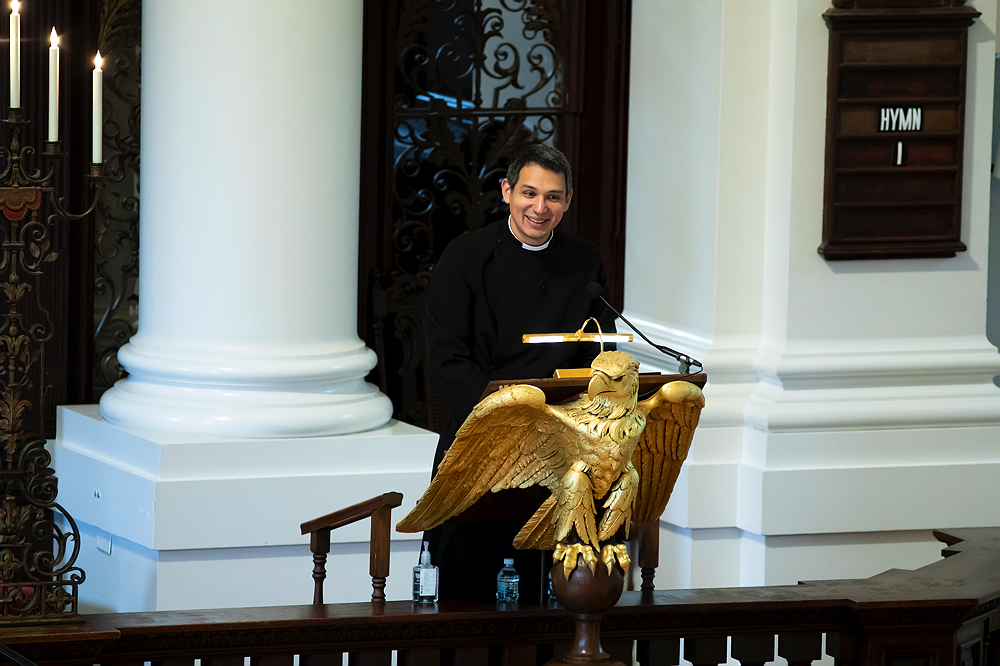
Speaking in the church—with COVID-19 attestations required for entry, and deeply distanced seating in the pews—Bacow observed that the prayer service began both the new year and the service of newly appointed Pusey Minister, Matthew Ichihashi Potts, who assumed his responsibilities July 1. Reflecting on the effects of the pandemic, which had such a significant impact on the University’s ability to function as a residential community of learners and teachers during the past 18 months, Bacow observed:
In the early days of the pandemic, I actually worried that being apart would erode our care and concern for each other. In fact, nothing could have been further from the truth. Seeing how we have pulled together, as individuals, as a community—all over the country and around the world—to support one another in our work and to fulfill our mission regardless of circumstances has been a constant source of inspiration.…I hope you feel—as I do—optimistic about the future, whatever it may bring, because of your experience as part of this special community during these most challenging times.
Turning to the present moment, when teachers and students can be in classrooms together again—albeit, mostly vaccinated, masked, and regularly tested for the coronavirus—he sought to apply the lessons learned since March 2020 to the Harvard community reconvening today:
I find myself wondering how we can bring the inclinations we have had over the last year and a half—to be generous, open, and understanding—to this space and to many other spaces across this wonderful institution that have stood empty for far too long. How can we ensure that the capacities we all have developed in the face of trauma persist and enrich the months and years to come? How can we demonstrate to our first-year students, who I welcomed yesterday at Convocation, that Harvard—a place that awes and intimidates the best of us—is really ready to embrace them?
The challenge, and importance, of doing so, he continued, are underscored by conditions prevailing in the larger society, and indeed in the world at large, riven by divisions even over basic public-health measures:
The world—it seems—often is at odds with those ends. By now, unfortunately, we have all seen or heard a story or two—or even more—or witnessed them ourselves, about rude and abusive customers at restaurants driving staff to tears or forcing resignations and closures by behaving badly. We have all seen or heard a story or two—or even witnessed ourselves, I'm sorry to say—about individuals refusing to wear masks, refusing to protect themselves and others, refusing to be responsible members of society. And those are unfortunately just a few examples. There are more, many more, of a type of meanness and crudeness for some who seem to delight in the suffering of others.
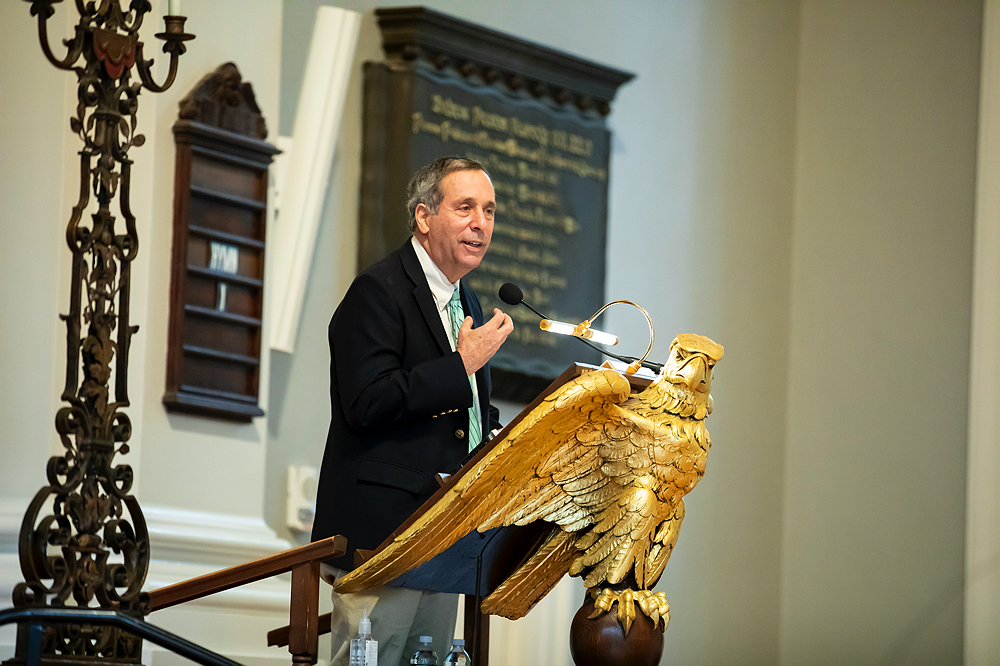
Turning to his own faith, as he often does (and not just in Memorial Church), the president then taught a lesson about both how to behave, and the meaningful scale of such behavior, at an august institution whose community members sometimes need reminding about such things:
My own faith teaches that we sanctify God when we treat others with kindness and respect. This of course applies to all the big moments when we have a chance to reach out and help each other in need of attention or assistance. But Judaism also puts special emphasis on the small moments—the everyday interactions that shape how people feel about one another and, in turn, how they feel about the capacity for goodness among all people. Offering an example, the Talmud actually places its readers in a busy butcher’s shop, believe it or not, where even the simple act of paying for what one has received in a timely manner, in a cordial manner, reveals character, inspires others, and honors God.
Being a member of this community, I think, creates ceaseless opportunities to excel in small moments, to treat equally well all of the many people who come to Harvard to live, to work, to learn….May we commit ourselves—this year of all years—to making our University a bit kinder, a bit gentler, a bit more generous, a bit more understanding. May Harvard be as humane as it is humbling. And may we all stay safe and healthy in the year to come.
“Resilience and Devotion”
In a Monday morning email titled simply, “A New Semester,” Bacow said that as he and his wife, Adele Bacow, helped first-year students move in last week, “Almost everyone we spoke with—students, parents, and families, as well as faculty and staff—expressed hope for the year ahead but also a bit of anxiety over what the future will bring.” Reading between the lines, one might infer a similar mix of emotions on the part of Harvard’s leaders: hopeful that the community will remain safe—and that it will truly function as a community of shared values and mutual respect:
“My confidence in us is based on experience,” the president wrote:
I have watched with pride as you have worked seemingly without end to help humanity since the earliest days of this crisis. Some of you have been working on the frontlines and saving lives in the ever-shifting landscapes of medicine and science. Some of you have been examining how people and communities have responded to the disease, devising ways for learning and working to continue despite disruption, or imagining what the future might look like after all of this is in our rearview mirror. Some of you have been contributing to efforts to speed vaccines—two of them, Johnson & Johnson, and Moderna, with origins in Harvard labs—into the arms of more people around the world. And many of you have been working to address the profound inequities—racial, economic, and social—that have been laid bare by this pandemic.
He also acknowledged the efforts that enabled the University, a very traditional place thrust into very untraditional circumstances, “to preserve our core academic mission of teaching a scholarship” and made it a point “to salute your resilience and your devotion to the University and, more important, to one another.”
Having (mostly) come back together on campus, he concluded by invoking the place’s better angels, come what may: “Our bonds of appreciation and affection make learning and working together meaningful, and they infuse our interactions with joy and purpose. I consider myself very fortunate to be a member of this community….”
Convocation(s): “Constant Care for One Another”
In the dual convocations Tuesday morning and afternoon, Bacow acknowledged, “We are all finding our footing this semester….” In a gentle way, he reminded the members of the class of 2024—uniquely celebrating an in-person convocation following last year’s online one—that their status on campus (vaccinated, masked indoors, etc.) did not exhaust their responsibilities to others in the community:
[T]he individuals who are here teaching you, coaching you, reshelving your library books, making your meals, cleaning your classrooms—the list goes on and on—may be returning home to young children whose freedom and opportunities are still limited by the pandemic.
In other words:
Preserving our community—maintaining the ability to be together—depends on constant care for one another, especially as circumstances change. By now, we all know what it takes to stay safe—and I ask that you continue to be responsible and considerate people as we make our way through the semester together. The more we work together, the more likely we will be able to provide you with as normal a College experience as we can.
But something else was on the president’s mind, too—not simply being together, but succeeding as a residential community devoted to learning and discovery:
I hope you will seize the opportunity to build a better community, a more compassionate community, a kinder community. I still have yet to meet anyone who thinks the world we live in—or the University to which we belong—is perfect. It is entirely possible that your view of how things ought to be is at odds with the view of someone just a few seats away from you. Never forget that we learn from our differences. Interrogating your own beliefs—and being open to thinking differently about your own assertions and assumptions—is what leads to wisdom. Learning and growing in wisdom is what being here—and being here together—is all about.
Doing so, he concluded is the way for everyone to “enjoy all that this remarkable University has to offer…especially one another’s company.”
“Find Your Portion”
Speaking for the first time to the class of 2025, Harvard College dean Rakesh Khurana emphasized the message about listening to other perspectives. At the heart of his remarks, he said:
If listening with intention and humility sounds difficult and uncomfortable, it is. We humans expend enormous amounts of energy avoiding hard truths and engaging in self-deception. We spend more time telling than listening. We listen for an opening to talk rather than listening to learn. We steer a question away from the one was asked to the subject we believe we can one-up the questioner. To save face or preserve self-esteem, we go through extraordinary lengths to avoid saying I was wrong, or we blame others for our mistakes.
My mom used to say nature gave us two ears and one mouth for a reason. Listening with humility means hearing what someone is saying and picking on the emotion behind the words; inferring what was left unsaid. It means not simply waiting for that pause and so that you can start talking. Listening with humility means being open to being wrong, open to nuance that you may not have considered. It means understanding that our identities are connected to our questions, but also at the same time, that we need to wear our identities lightly so we can hear or approach the question in the most thoughtful and complete way, and that's hard.
To remain open to hearing many voices does not mean that we should ever listen without critique to a point of view that is not sensitive to history or context, to words that are hurtful. No one should be attacked as an individual or a group because of their identity. And, intellectual vitality requires civility, personal responsibility and accepting criticism. We also know that just because you have the right to say something doesn’t mean it is right to say. There are always going to be moments when the right decision is to speak and to call out hate.
Listening does not mean agreeing. If you listen carefully, you will be better equipped to disagree. You will know when someone is speaking dogma. You can better understand how perception and delusion work. What the roots of anger and suffering are. You can understand what we see clearly and what is obscured. Listening wakes up our better selves. Listening means that you are committed to the idea that there is much you do not know. And frankly, listening is our best hope for creating a world we want to live in.
Bacow cast the opportunities and challenges before the newest members of the Harvard community in slightly different terms, as he sought to “share my thoughts on how you might seek meaning and happiness in the weeks and months and years ahead”—while again underscoring the dual messages of approaching one another with a willingness to learn and in a spirit of mutual concern and support during a continuing health crisis:
There are a lot of books on the topic—and at least a billion TikToks—but the best advice I have ever read comes from an ancient source—the Talmud, a sacred text in the Jewish tradition. In the volume, Ethics of Our Fathers, Ben Zoma asks three questions for the ages:
Who is wise?
Who is mighty?
Who is wealthy?
Who is wise? The Talmud answers, “The person who learns from all people.” A seat away from you—a row away from you—is someone who sees things very differently than you do, someone who holds fast to beliefs that are odds with your own. When you meet that someone—and you will—your first impulse may be to make your point, loudly and clearly. Try to resist that urge. Listen. Ask questions. Prompt conversation rather than conflict. If you leave this place with your backs to those who do not share your views, you will have failed to take advantage of one of Harvard’s greatest strengths—the diversity and dynamism of our community. Never forget: We learn from our differences.
Who is mighty? The Talmud answers, “The person who exercises self-control.” Vaccination does not equal invincibility. The people you interact with daily may be returning home to family members who are not yet eligible to be vaccinated or who are at special risk of complications should they get the virus. Some of your classmates may be immunosuppressed or suffer from conditions that make them particularly vulnerable to this virus. Be mindful of them as you navigate your new home. Being part of this community—this year in particular—means bearing special responsibility for the health and safety of others. Please, please care for one another and for yourself.
Who is wealthy? The Talmud answers, “The person who rejoices in his or her portion.” There is nothing wrong with ambition, but ambition for ambition’s sake can be a distraction. Over the next four years, I hope you will devote luxurious amounts of your time to understanding what truly satisfies you. Not your friends. Not your family. Not your community. You. To rejoice in your portion, you must find your portion—the endeavor that swells your heart and fills you with a deep sense of satisfaction and wonder. Believe me when I tell you that devoting yourself to something that matters to you will change your life. And, if you are like generations of those who have come before you, many of you will find that special something during your time here.
Illustrating that last point, and pivoting from the text of the Talmud to the immediate possibilities of direct human connection, the president concluded with a personal note of the sort that is his hallmark—and one that might well connect him, the new students’ professors, and their own generation in common bond across their respective ages, at this most unusual moment in 2021:
This past weekend I gave a toast at the wedding of the daughter of one of my closest friends from college. We met fifty years ago—about 150 steps from here—in a class in Emerson Hall. I was best man at his wedding. My wish for each of you is that during the next four years you will meet classmates who will become your closest friends for life. They are here right now in this gathering. Your job is to go find them.
I am thrilled to welcome all of you to Harvard and excited to see how you grow in wisdom, might, and wealth as the Talmud defines them—and how you choose to seek meaning and happiness both here at Harvard and wherever life takes you. In the meantime, enjoy yourselves, have fun, make friends, and please stay healthy.
Now, it is the students’ turn (with their fellow Harvard community members, the faculty and staff) to do their part together in keeping themselves and others safe, so they can make the very most of the privileges they now enjoy. And outside, miraculously, there they were, strolling and scootering across Harvard Yard, off to their first classes of the new, and new-normal, semester.
